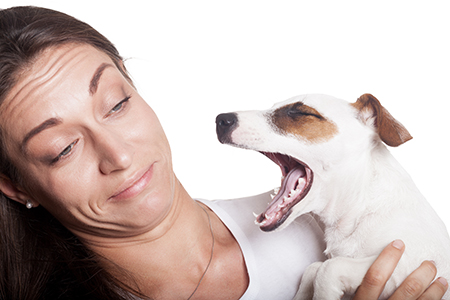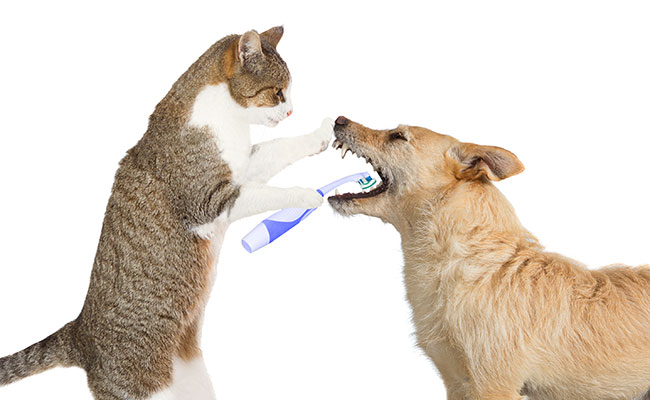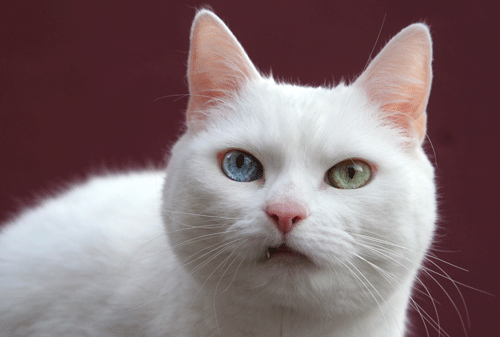 Proper dental care for your pet is just as significant as quality dental care for humans. In fact, brushing your pet’s teeth on a regular basis may prevent numerous dental issues like early tooth decay, gum disease and other problems. In addition, by regularly brushing your pet’s teeth you will be more aware of any professional dental care that may be needed.
Proper dental care for your pet is just as significant as quality dental care for humans. In fact, brushing your pet’s teeth on a regular basis may prevent numerous dental issues like early tooth decay, gum disease and other problems. In addition, by regularly brushing your pet’s teeth you will be more aware of any professional dental care that may be needed.
Better Breath and Health
Typically, a pet that has healthy teeth will generally have better breath. Although dogs breathe often smells horrible, it is generally a sign of dental disease. In fact, dental disease affects up to 80% of pets over the age of three. Moreover, there can be serious issues when dental health is poor. For example, infections in the gums and teeth can affect the heart, kidneys and liver with impurities. Conferring to Dogs Naturally Magazine, dental disease affects more than the teeth and may lead to serious health problems like:
- Fractures in the jaw
- Abscesses of the tooth root
- Difficulty regulating sugar metabolism
- Infection in the blood (Septicemia) – leading to shock and death
- Sinusitis and Nasal discharge – chronic sinusitis may be from a tooth root issue
- Infection of the bone (Osteomyelitis) – tooth infections can spread to other bones because tooth roots are attached to the jawbone
- Damage to heart valves which can cause heart failure, liver and kidney damage – mouth can work its way into the circulatory system and into the liver and kidneys via filtration system
How to Detect Dental Issues in Your Pet
 Generally the first sign of dental issues is bad breath. Carefully, lift up your pet’s teeth and lips to check for gum inflammation, tartar and broken or missing teeth.
Generally the first sign of dental issues is bad breath. Carefully, lift up your pet’s teeth and lips to check for gum inflammation, tartar and broken or missing teeth.
Both cats and dogs may have signs of dental problems like a lack of enthusiasm to play, unwillingness to eat, bleeding gums, “chattering” of the teeth when eating, fatigue, disinterest in grooming (mostly cats) and worn-down teeth. There can also be increased drooling, particularly in cats.
Dental disease advances in stages. However, if you catch the disease early you may be able to prevent additional damage and save most of your pet’s teeth.
Prevention and Good Oral Health
According to Pet Health Network, your pet needs regular dental care and good oral health in order to prevent dental disease. In fact, caring for your pets teeth may actually prevent other diseases plus save you money in the long run. The truth of the matter is; pets that don’t receive dental care can experience excruciating pain and serious health problems. What is more, many pets are good at hiding their tooth pain. In fact, oftentimes a pet owner does not realize their pet has a serious dental problem until it has greatly advanced.
One of the best ways to prevent dental disease is by brushing your pet’s teeth on a regular basis. As well, regular dental check-ups are recommended to prevent dental disease and other health issues.
Whitworth Animal Clinic
If you suspect that your pet has dental disease or you are concerned about your pet’s teeth, contact a knowledgeable veterinarian as soon as possible.
Additionally, make certain to schedule an appointment while your pet is young and once their adult teeth come in. Generally all teeth fall out by the time your pet is 6 months old. However, sometimes permanent teeth come in prematurely before the baby teeth have fallen out.
For good oral health, it is advantageous to schedule a check-up with your vet if your pet is over three years old. Your vet can check for underlying problems and a dental cleaning if needed.
At Whitworth Animal Clinic, Dr. Charles Whitworth offers superior care for your pet. In fact, Charles D. Whitworth, DVM has more than thirty years of commitment as a veterinarian in the Madison region. Not only does the Whitworth Animal Clinic provide the highest quality medical and surgical care for your pet but they always strive for excellence.
If you have any concerns or questions about dental disease, contact Whitworth Animal Clinic. The clinic is suitably located in Madison and serves the neighboring area of northern Alabama plus Decatur and Huntsville in the Madison area.
Note: This post is not intended to replace any type of expert medical advice. If you have any questions or concerns about dental disease, make an appointment at Whitworth Animal Clinic.
© 2018 Whitworth Animal Clinic. All rights reserved.






